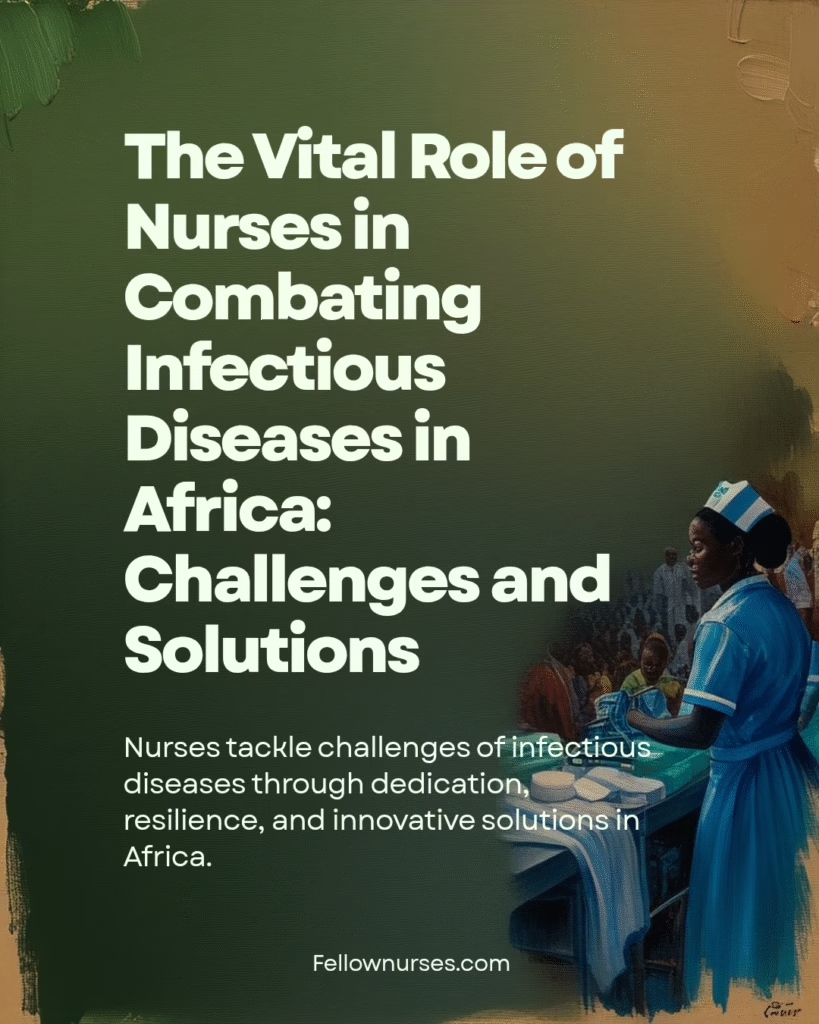Nurses: The Heartbeat of Africa’s Fight Against Infectious Diseases
Writen by Rudiyah Bature, for Fellow Nurses Africa
In the battle against infectious diseases in Africa, nurses are the unsung heroes, tirelessly working to protect communities, save lives, and build healthier futures. From bustling urban hospitals to remote rural clinics, African nurses are at the forefront, implementing infection control, educating communities, and providing compassionate care. This blog post explores their critical role, real-world contributions, challenges, and actionable solutions to empower them further.
What Are Infectious Diseases?
Infectious diseases, also known as communicable diseases, are caused by microscopic organisms like viruses, bacteria, fungi, or parasites that invade the body and multiply. These diseases spread through direct contact (e.g., touching, intimate contact, or sharing items) or indirect means (e.g., contaminated surfaces, food, water, or vectors like mosquitoes). In Africa, where environmental and socio-economic factors amplify disease transmission, nurses play a pivotal role in prevention and management.

Common Infectious Diseases in Africa:
- Malaria: Thriving in Africa’s warm, humid climates, malaria remains a leading cause of illness and death, with mosquitoes breeding year-round.
- HIV/AIDS: A persistent epidemic, particularly in sub-Saharan Africa, requiring ongoing prevention and treatment efforts.
- Tuberculosis (TB): A major public health challenge, often linked to crowded living conditions and limited healthcare access.
- COVID-19: A global pandemic that tested Africa’s healthcare systems and nurses’ resilience.
- Ebola: Devastating outbreaks, like the 2014-2016 West Africa epidemic, highlighted nurses’ courage in crisis.
- Others include influenza, measles, strep throat, and sexually transmitted infections.
The Multifaceted Role of Nurses in Combating Infectious Diseases
African nurses are more than caregivers—they are educators, advocates, and frontline warriors. Here’s how they contribute:
- Prevention and Infection Control
- Hygiene Protocols: Nurses enforce handwashing, proper use of Personal Protective Equipment (PPE), and sterilization to curb disease spread.
- Vaccination Campaigns: They administer vaccines, manage cold chains, and educate communities on immunization benefits.
- Isolation and Containment: By identifying symptoms early and isolating patients, nurses prevent outbreaks in healthcare settings.
- Patient Care and Management
- Monitoring: Nurses track patients’ symptoms, vital signs, and treatment responses, ensuring timely interventions.
- Medication Administration: They deliver precise doses of antibiotics, antivirals, or supportive medications.
- Supportive Care: From hydration to nutrition, nurses provide holistic care to aid recovery.
- Health Education and Community Outreach
- Public Awareness: Nurses educate communities about disease symptoms, transmission, and prevention for conditions like TB, HIV, and malaria.
- Behavioral Change: They promote safe practices, such as proper sanitation and safe sex, to reduce transmission.
- Myth-Busting: Nurses combat misinformation, fostering trust in evidence-based health practices.
- Surveillance and Reporting
- Early Warning Systems: Nurses report unusual symptoms or outbreaks to health authorities, enabling rapid response.
- Data Collection: They record epidemiological data, aiding disease tracking and public health strategies.
- Emergency Response
- Outbreak Management: During epidemics like Ebola or COVID-19, nurses deliver urgent care under challenging conditions.
- Triage and Coordination: They prioritize patients based on severity and collaborate with multidisciplinary teams.
- Policy Advocacy and Research
- Advocacy: Nurses push for better infection control policies and increased healthcare funding.
- Research: They contribute to studies on disease management and prevention best practices.
Real-World Impact: Nurses in Action
Nurses across Africa have been instrumental in tackling major health crises:
- COVID-19 Pandemic: Nurses led the charge in educating communities on mask-wearing, hand hygiene, and social distancing. They managed PPE under pressure and minimized transmission in hospitals, often at great personal risk.
- Ebola Outbreak (2014-2016, West Africa): Nurses worked in Ebola Treatment Units, managing severe symptoms like fever and bleeding while collaborating with organizations like Médecins Sans Frontières (MSF) to contain the virus.
- HIV/AIDS Epidemic: In sub-Saharan Africa, nurses provide testing, counseling, and antiretroviral therapy (ART), with nurse-led clinics improving access to care.
- Measles Outbreaks (DRC): Nurses trekked to remote villages to deliver vaccines, often under grueling conditions, helping curb deadly outbreaks.
- Influenza Surveillance: By reporting cases to flu networks, nurses help governments prepare for seasonal outbreaks.
- COVID-19 Vaccine Rollout: Nurses designed vaccination sites, administered shots, and collected data on vaccine efficacy and side effects.
Challenges Facing African Nurses
Despite their critical contributions, nurses face significant obstacles:
- Resource Shortages: Limited access to PPE, medications, and diagnostic tools hampers care, especially during outbreaks.
- Understaffing: High patient loads and staff shortages lead to burnout and fatigue.
- Poor Infrastructure: Many rural facilities lack basic equipment, forcing nurses to work in unsafe conditions.
- Limited Training: Few opportunities for professional development restrict nurses’ ability to stay updated on new protocols.
- Insecurity: Conflict and violence in some regions make it dangerous to reach vulnerable communities.
- Low Wages and Job Insecurity: Poor compensation and unstable employment discourage retention and morale.
Recommendations for Empowering Nurses
To strengthen nurses’ impact, a collaborative approach is essential:
- Invest in Infrastructure: Governments and partners must equip rural clinics with PPE, medicines, and diagnostic tools.
- Enhance Training: Regular workshops and updated curricula on infectious disease management will keep nurses skilled.
- Improve Working Conditions: Better wages, job security, and accommodations for remote postings can reduce burnout.
- Empower Leadership: Involve nurses in health policy decisions and provide leadership training to amplify their influence.
- Community Engagement: Leverage nurses as trusted educators in public health campaigns to build community trust.
- International Support: Global health organizations should fund nurse-led initiatives and supply chains for critical resources.
Conclusion: Nurses Are Africa’s Health Heroes
Nurses are the backbone of Africa’s fight against infectious diseases, serving as caregivers, educators, and advocates in even the most challenging settings. Their tireless efforts in hospitals, clinics, and communities save countless lives and prevent disease spread. However, systemic challenges like resource shortages and poor infrastructure must be addressed to unlock their full potential.
By investing in nurses—through better facilities, training, and support—Africa can build resilient health systems capable of defeating infectious diseases. Together, we can empower nurses to continue being the heartbeat of healthcare, bringing brighter, healthier futures to communities across the continent.
Together, we can make a difference. Support nurses, strengthen healthcare.
Written by Rudiyah Bature for Fellow Nurses Africa
Join the conversation: How can we better support nurses in Africa’s fight against infectious diseases? Share your thoughts below!










